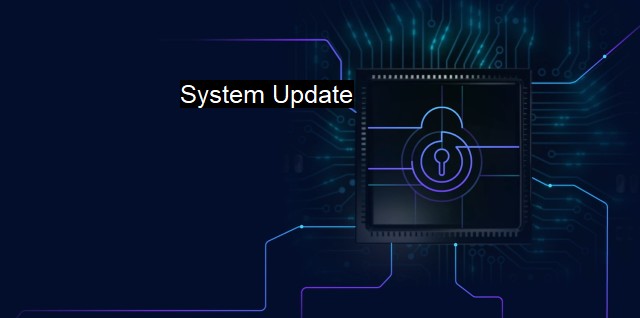What is System Update?
The Hidden Gem of Cybersecurity: The Essential Role of System Updates in Protecting Your Devices
System update, in common parlance, refers to the process of replacing software with newer versions of the same, rectifying faults, improving its overall performance, or updating the system with entirely new features or capabilities. In the context of cybersecurity and antivirus software, a system update is utilized to strengthen protection against potential threats, which usually evolve faster than the system's protections.The primary purpose of system update in the realm of cybersecurity is to maintain digital health by protecting the system from evolving threats such as viruses, malware, ransomware, spyware, phishing attacks, zero-day exploits, amongst others, endorsing the crucial role it assumes in up-to-date threat detection and protection.
With the growing sophistication of cyber-attacks, dated antivirus detrimentally affect a systems defense capability. Every system update consequently comes with upgraded defensive mechanisms better equipped to combat new and advanced threats. they come with patches or updates to the security flaws identified in the previous software versions.
In some occasions, a patch, a software update intended specifically to fix specific bugs or security vulnerabilities, like the 'WannaCry' ransomware, which exploited vulnerabilities in Windows OS systems, can exploit an outdated system. It took Microsoft releasing an emergency patch to stop the exploit. Thereby highlighting the crucial role system updates play in cybersecurity.
Rapid advances in technology have simultaneously led to increased vulnerability of systems requiring periodic software updates. Yet, these updates are stressful, often requiring a system reboot and extending periods. Understanding this, contemporary cybersecurity software developers often create system updates that users can download and install in the background, causing minimal disruption to their activities.
The cybersecurity landscape today is a fast evolving one. The strains of viruses or malware that antivirus software is designed to protect against mutate quickly. Ignoring system updates allows malevolent software—the type specifically designed to bypass or altogether disable antivirus protocols—to infiltrate the system and cause irreversible harm.
Outdated antivirus or cybersecurity software may give a certain placebo effect of protection to users, but it provides an open window to potential threats, jeopardizing sensitive data's safety and security. This further underlines that regular system updates in cybersecurity and antivirus are not merely an option but necessary for stronger protection against ever-evolving and sophisticated threats.
Another justification for system updates is the enhancement of general functionality and performance of antivirus software. System updates often contain improved algorithms for better system scanning, active threat detection, and software usage functions. updated antivirus applications conducive offer user-friendly interfaces inducing a better user experience.
Omitting system updates may also affect compliance with international standards if overlooked. Cybersecurity regulations demand continuous updating of antivirus software, making it constitutionally necessary in certain jurisdictions. Non-compliance not only jeopardizes the system's security but also leads to penalties for violating existing data protection laws, achieving regulatory compliance, and mandatory obligations.
Although system updates can sometimes come with their own sets of issues, such as compatibility problems with systems or certain bugs unnoticed during testing phases, they are, more often than not, rectified with subsequent updates.
“system update” serves as the first line of defense in protect the system against potential cyber threats. Hence, its significance in the cybersecurity and antivirus context cannot be overemphasized due to its momentous role in providing secure digital networks, protection against ever-evolving cyber threats introducing new features, better experience, and assistance with maintaining the system’s compliance with security standards. Regular system updates, therefore, embody a maintenance prescription even for seemingly secure systems, contributing to smooth operation and longevity.

System Update FAQs
What is a system update and why is it important for cybersecurity?
A system update is a software upgrade designed to address vulnerabilities and bugs in your operating systems, applications, and other programs. Updating your system regularly is crucial for cybersecurity as it patches known security holes and ensures that your system's security features remain up-to-date.How often should I update my system and antivirus software?
You should set up automatic updates for your antivirus software and operating system, so they update automatically as soon as a new version is available. Cybersecurity experts recommend updating your software as soon as possible after new releases, as vulnerabilities can be exploited quickly by cybercriminals.What should I do if my system update fails?
If your system update fails, you should try the update again after restarting your computer. If the problem persists, you may need to contact your antivirus software or operating system provider for support.Are there any risks associated with system updates?
There is always a small risk when installing updates, but the risk of not updating your system is much higher. Some updates can cause compatibility issues with other software or devices, and in rare cases, an update can cause data loss. However, ignoring updates leaves your system vulnerable to security breaches, which can lead to data theft, malware infections, and other security problems.| | A | | | B | | | C | | | D | | | E | | | F | | | G | | | H | | | I | | | J | | | K | | | L | | | M | |
| | N | | | O | | | P | | | Q | | | R | | | S | | | T | | | U | | | V | | | W | | | X | | | Y | | | Z | |
| | 1 | | | 2 | | | 3 | | | 4 | | | 7 | | | 8 | | |||||||